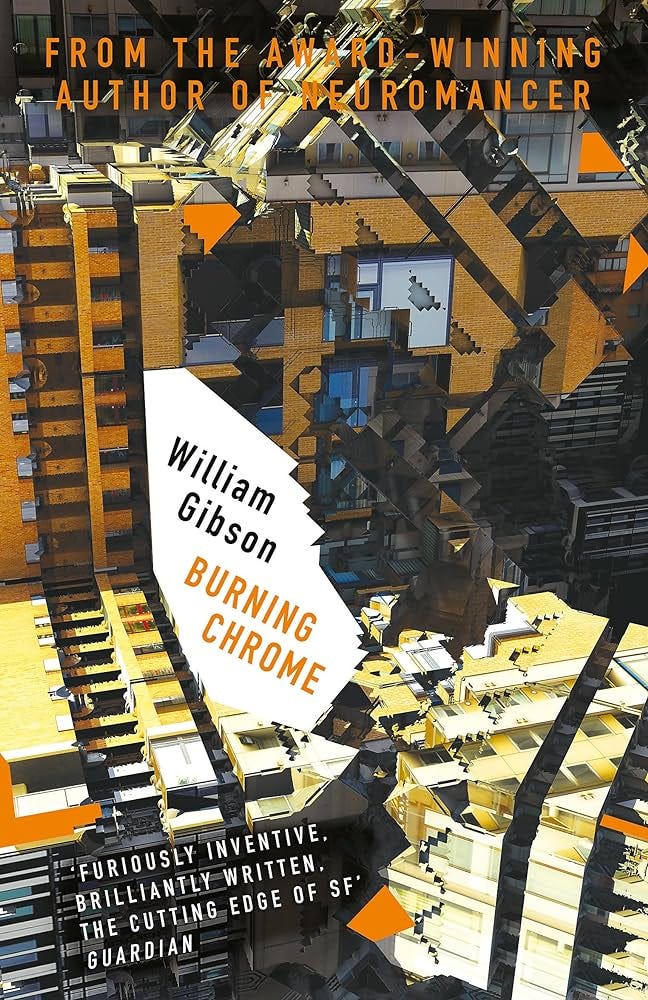Bringing Darkness to the Stars
Burning Chrome by William Gibson
Greetings, my fellow literature-lovers!
Today, I’m hugely excited to bring you the one and only, Gareth L. Powell!
Gareth is the award-winning author of 20 books — these have been adapted for TV, nominated (and won) many awards, and have been translated into no less than eleven languages! Readers of Gareth's Newsletter are privy to his expert advice on writing, publishing, and the secrets to building a career in fiction, as well as keeping up to date with all his publishing news.
Today, he invites us into the book that made Gareth a writer. Enjoy!
I recently put up a post on my newsletter listing the five books that have had the biggest influence on the style of my recent work. However, the book that made me wasn’t on that list.
Having grown up reading the science fiction of the 1960s and 1970s, I had this image of the future as utopian technocratic wonderland. Sure, there might be aliens out there and the human race might get into trouble once in a while, but on the whole we were going to sail the stars, overcome alien threats, and banish death, disease and famine to the dustbin of history. It was a naïve dream, maybe, but it was one that fired my imagination and kindled my passion for storytelling. However, when I tried to write my own versions of those tales, I struggled to inject any sort of originality. The scientists and lantern-jawed captains that populated them weren’t the kind of people I knew in real life, and I consequently struggled to produce anything that felt in any way authentic.
It wasn't until I encountered William Gibson's short story collection, Burning Chrome, that I realized there might be a different path to tread, a grittier and more grounded approach that would transform my writing forever.
Gibson's stories turned my perception of the future on its head. This book blew my socks off. It took the pristine future I’d been familiar with and rubbed its nose in the dirt. It took everything down to the level of the street, where flawed characters, driven by selfish desires and insatiable greed, moved through a landscape rife with challenges. But, more than that, it was the pared-down, direct and honest prose that taught me every word mattered, and I didn’t have to communicate like a scientist in order to write science fiction.
They say everyone who listened to the Velvet Underground’s debut album went out and formed a punk band. In many ways, Burning Chrome had the same galvanising effect on me. Just as the Velvets redefined the artistic possibilities of rock and roll music, Gibson's work reshaped the remit of speculative fiction, forging a world where the streets held as much significance as the stars.
Gibson's influence wasn't confined to the realm of science fiction alone; it led me to the noir worlds crafted by Raymond Chandler and Ernest Hemingway, who each taught me valuable lessons about realistic dialogue, descriptive brevity and careful word selection.
The impact on my writing was profound. I tore up my early efforts and began writing gritty short stories featuring hustlers, assassins, dusty archaeologists, and escaped hackers. These weren’t super-capable heroes; they were people like you and me, dealt a bum hand and doing their best to survive. And through them, I began to find my own voice.
Since then, over the course of numerous short stories, a handful of novellas, and eleven novels, I’ve grown and developed as a writer. But if I had to pinpoint the single book that had the most significant impact on shaping my writing style, it would undoubtedly be Burning Chrome. Gibson showed me a new way of doing things, and a narrative landscape based on ordinary people in extraordinary situations, where characters are as human as they are alien, and where the art of writing is one of reportage as well as unbridled creativity.
Gareth L. Powell is an award-winning author known for his thriller-style pacing, mordant wit, and complex, achingly human characters – as well as for the encouragement and advice he offers aspiring writers. He has twice won the coveted British Science Fiction Association Award for Best Novel, and has become one of the most-shortlisted authors in the award’s 50-year history. He has also been a finalist for the Locus, British Fantasy, Seiun, and Canopus awards. About Writing, his field guide for aspiring authors, also topped the Amazon charts and continues to inspire a new generation of upcoming authors.
His latest novel, Descendant Machine, is out now from Titan Books and available via all good booksellers. https://linktr.ee/garethlpowell
His Substack newsletter contains tons of valuable, hard-won insight for aspiring and established authors alike.
P.S. If you’d like to write for The Books That Made Us, please see here. For more ways of getting your writing in front of new readers, consider becoming a paying subscriber today.




I'm a big Gibson fan, too, both for his vision and for his prose style. He does a really marvelous job describing scenes through his characters.
Wonderful tribute to Gibson. I agree that often the most defining moments in our lives are when we see someone else doing something and think, “wait, you can do it like THAT?!”